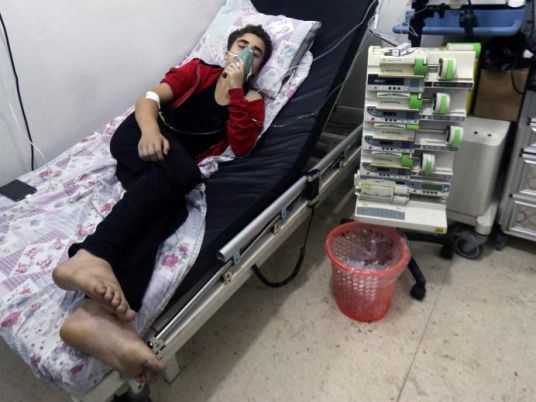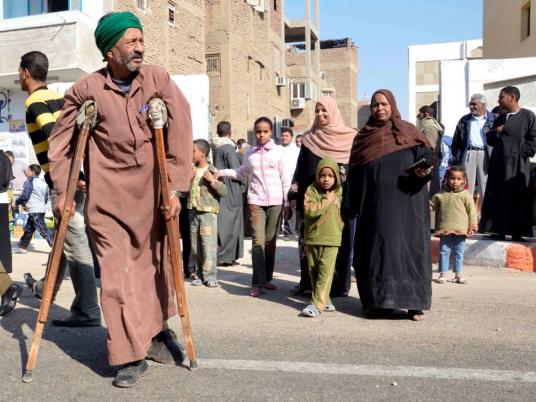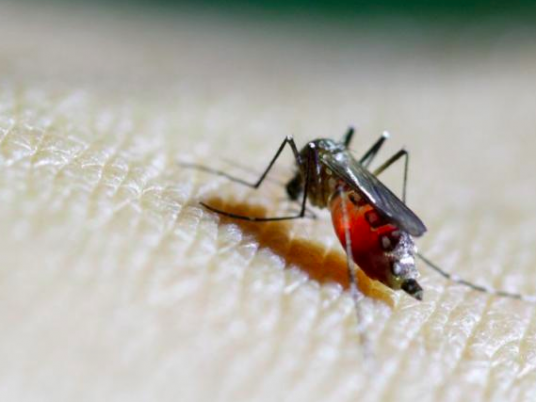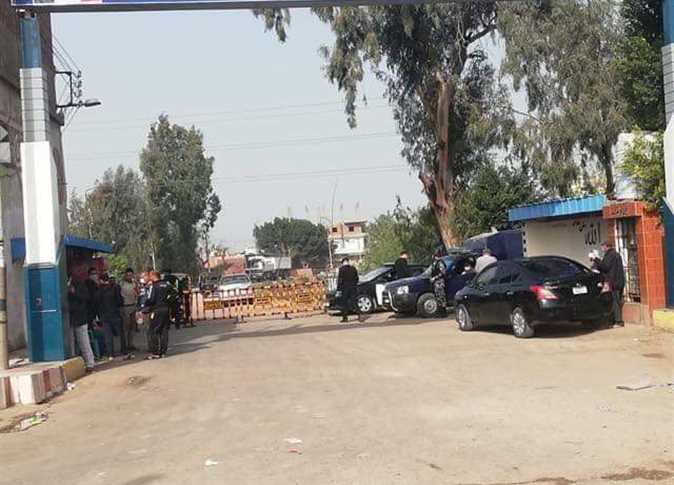Qena – When Qena residents went to vote in the past, they generally had only one concern: that the tribe’s candidate win. But because Egypt’s revolution dismantled the ruling National Democratic Party (NDP), which supported tribalist tendencies, Qena is now approaching the first parliamentary elections in recent history in which tribal allegiances will compete with ideologies.
Three trends are now competing across tribes: Islamists, reformists, and the remnants of the NDP, represented by tribal leaders. Most other movements and new parties launched in Cairo have failed to reach the people of Qena.
Unprecedented cooperation is now taking place between members of different tribes within each trend, but it remains to be seen whether this cooperation will survive as tribal competition peaks around the elections, scheduled for September.
Mohamed Hassan, a former NDP member of parliament and a young leader in the Ashraf tribe, describes the situation as competition between NDP-backed tribalism and revolutionary forces trying to free Qena from it.
“It’s like we are playing a game of cards," he says. "The other team thinks it's ahead, but we have the winning card, and we will play it at the very end of the game."
“The next time you’re here [after the elections], you’ll be congratulating us,” Hassan says.
Qena’s traditions limited election competition to choices between the three major tribes: Ashraf, Arabs and Hawara. Regardless of political affiliations or personal merit, the success of the tribe’s candidate was seen as bringing prestige to the whole tribe.
“Before the revolution, every candidate would get the votes of his tribe – not because he’s good, but because the tribe would be mocked if it didn’t win the parliament seat. They think it will give the tribe a leading role, and they want to have someone to serve the people of the tribe,” says Ahmed Fathy, a member of the “positivity” campaign in Qena, which aims to increase political awareness and decrease tribal influence.
But Fathy says the tribal candidates "never serve anyone but themselves, and they always end up joining the NDP.”
Most Qena representatives became NDP members either before or after winning their seats, with very few exceptions. But those who partook in the NDP system say they had no choice. If they hadn’t, they say, votes would have been rigged against them.
“I was seeking to serve the people through the party, but nothing good came out of it. I was shocked at what I found inside, and I left the party right after the revolution,” says Ahmed al-Gabalawy, a leader of the Arabs tribe who served in Parliament in 2005 as an NDP member but was excluded from the party’s list in 2010. He says all the party’s decisions were orchestrated in Cairo without the input of local leaders.
Though Gabalawy and other former NDP MPs claim they formed an opposition current inside the party, trying to fight corruption and serve their constituents, the majority of Qena residents seem to perceive them as corrupt politicians. After Mubarak stepped down on 11 February, cars went around Qena with loudspeakers announcing people’s rejection of those leaders name by name.
Saleh Zanaty, a farmer in Qena, says he – like many Egyptians – is fed up with NDP-run politics.
“We want a new face, we don’t want to see the NDP anymore. The NDP gathered the trash of society and made them society leaders,” Zanaty says.
Hamada Badawy, a teacher who belongs to the Homaydat tribe, believes that the end of the NDP’s monopoly on politics could have a role in decreasing tribalism.
“Before the revolution, the people thought that since an NDP member will win anyway, he might as well be my cousin, but the situation has changed now,” Badawy says.
But other Qena residents believe tribalism is too deeply rooted to be removed, even with a revolution.
“Even after 100 revolutions, tribalism will always rule in Qena,” says Amgad Rafaat, a taxation employee.
Rafaat could be proved wrong, though. Recent signs show that NDP members are losing their grip on their tribes.
At the request of state security, tribal leaders prevented members from taking part in the 25 January revolution. Qena residents say their leaders used weapons to prevent them from protesting throughout the 18-day uprising.
But on the last day before Mubarak’s resignation, the people of Qena broke their silence and protested despite attempts by tribal leaders to stop them.
Tribal leaders also failed to enforce their rule in mid-April, when Qena residents blocked the railway for 11 days to show disapproval of the military’s selection for Qena's new governor. They went to the sit-in repeatedly to convince residents to reopen the railway but failed.
“The people at the bottom are starting to mobilize on their own,” Fathy says.
The last straw for NDP-affiliated tribal leaders was when Prime Minister Essam Sharaf visited Qena early this month. The acting governor indirectly asked NDP members not to attend the meeting so as not to aggravate youth associated with the revolution.
Hassan, however, is among those who did attend, and he says he did it to make a point.
“I will not allow anyone to exclude me from politics,” Hassan says. “No one has the right to exclude a certain current from politics.”
NDP-affiliated heads of tribes realized that the competition they now face is not each other, but other political trends. Thus they have formed an coalition between all the tribes and large families of Qena, as well as representatives from the minority Christian community.
In its founding meeting, the coalition's discussion did not address national unity, which the founders claimed to be its official aim when it was formally launched afterward. Instead, conversation revolved around regaining the tribal grip on politics in Qena, countering the Islamic current and defending NDP alumni against forces trying to exclude them from politics.
Laila Khalifa, a former independent MP from Qena, is heading efforts to unite youth coalitions in one movement against tribalism and former NDP members. Though she is immersed in continuous awareness efforts, Khalifa expects that she will not see the fruits of her labor in the upcoming parliamentary elections.
“Tribalism is still very much reigning. The people will vote for those who they already know,” Khalifa says.
As young members of each tribe join hands in youth coalitions to try to exclude NDP remnants from the political scene, Hassan is counting on tribalism to stymie their efforts.
“The people who are now united on excluding the party will differ at the time of the elections,” said Hassan.
Many seem to be struggling to choose between their thirst for change and their tribal allegiance.
Gamal Tawfik, an agricultural engineer, says he is happy that, because of the revolution, votes will go to those who deserve them. However, he said he still intends to vote for his tribe’s candidate in the elections.
Mahmoud Nasrallah, a member of the Hawara tribe and a leading Muslim Brotherhood figure in Qena, has been fighting a hard battle against the NDP in parliamentary elections since he first ran in 1979. He says the tribe always knew the right candidate to choose but put their interests ahead of their principles by choosing the NDP candidate.
“The most powerful trend now is the Islamists. Those who were marginalized have now become strong, and the tribes will go with the strongest trend,” says Nasrallah. “They will have no other option.”
Nasrallah expects the same tribal forces that empowered the NDP for decades to now empower Islamists.
All political forces are competing to attract Qena’s youth in particular.
While Khalifa is hopeful that youth are starting to rebel against their leaders, NDP tribal leaders are confident they will be able to “convince our youth to change what’s on their mind and return to their tribes,” in the words of Gabalawy.
Some of the leaders present in the founding meeting of the tribal coalition expressed anguish over their diminishing control, while others were confident that tribal legitimacy will triumph over all other forces. Hassan said he believes Islamists’ strength is born of tribes’ weakness and can easily be overcome by unity among the tribes.
Gabalawy is also confident that tribalism will triumph come election time, despite activists' efforts.
“Those who are doing this have aspirations that surpass their abilities,” he says. “They think that they will be able to reach the summit without building a base. We will let them go as high up as they want, but they will only fall on their faces.”




